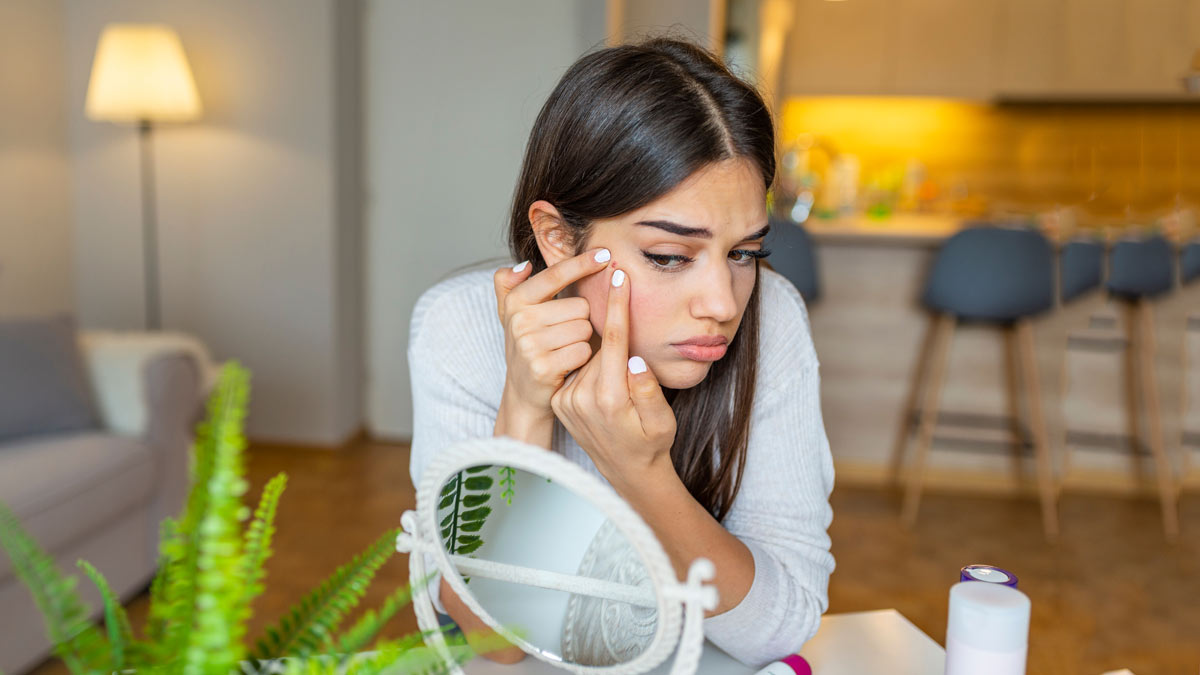
Period acne appears or flares up during every cycle that coincides with your period. According to a study, a majority of respondents reported the onset of period-related acne between the ages of 12 and 18 years. And 65% of people reported their acne symptoms worsening with their menses.
The acne usually occurs seven to 10 days before menstruation and gets better depending on the person’s hormonal levels. Here is an ultimate guide to period acne—causes, tips, and prevention.
The first step is to differentiate between a hormonal break out and a regular one. Looking at the timing of when the acne appears is the easiest way to do so. Period acne commonly appears a week leading up to your period. Additionally, it gets better when the period is ending or is over.
People who already have acne may see their acne worsening. And those with clear skin may notice tiny pimples.
Hormones fluctuate continuously throughout the 28 days of your cycle. The levels of oestrogen and progesterone rise during the first and second half of your cycle respectively. But as your period approaches, these hormones see their levels dropping, while the levels of testosterone in your body remain the same.
The increase in progesterone half way through the luteal phase (when ovulation occurs and your period starts) stimulates the sebaceous glands to secrete sebum, an oily and thick substance that lubricates the skin naturally.
Moreover, the hormonal interactions in the luteal phase may cause compression of skin pores which can lead to sebum building up under the surface of the skin.
Higher testosterone levels before and during your period can cause sebaceous glands to secrete even more sebum. While some people may experience a healthy glow, others may get period acne as the pores become clogged up with debris, dirt and dead skin cells.
This increased sebum can give way to formation of bacteria that leads to acne called Cutibacterium acnes, hence interacting with the immune system, causing inflammation and pimples before your period.
Don't miss:My Struggles With Acne: How Therapy Helped

There are a number of topical and oral medications to treat period acne, however consulting with your dermatologist before the start of any treatment is important.
Alpha hydroxy acids such as lactic and glycolic acid improves the skin’s turnover and prevents pore blockage. Azelaic and salicylic acid have anti-microbial and anti-inflammatory properties, and the latter acts as a chemical exfoliant, seeping into your oil glands and dissolving blocked dead skin cells which lead to acne. Overdoing it can cause irritation.
Moreover, benzoyl peroxide improves oxygen production and kills anaerobic bacteria, while retinoids–Vitamin A compounds, play a role in immunity and skin health.
Any kind of oral medication should be taken on prescription such as birth control pills, Spironolactone (reduces levels of testosterone and production of oil), low-dose antibiotics ( for acne lesions), and Isotretinoin (for cystic acne). They can have side-effects depending on the person’s body.
Don't miss:Pimples On Buttocks: Causes And Management Tips
Bacteria on your skin can exacerbate acne, so maintaining good skin hygiene by keeping your skin clean, not touching your face, and cleansing your skin twice a day is important. The phone can carry harmful bacteria and needs to be disinfected regularly. Moreover, taking a bath after exercise is a good practice in hygiene.
Avoid smoking entirely as it has a direct correlation with acne. It can lead to an inflammatory condition called acne inversa or irreversible scarring. And limit your exposure to UV rays by wearing a non-oily moisturiser with sunscreen.
Most importantly, maintain a healthy weight. Obesity can reduce sex-hormone binding globulin (SHBG) sensitivity which helps fight acne. This protein soaks up testosterone in your blood and having a healthy amount of SHBG means there is less testosterone to cause period acne. Eating a well-balanced diet with low glycemic index and plenty of foods rich in zinc, omega-3 fatty acids, selenium, Vitamin A and E can improve your acne.
Our aim is to provide accurate, safe and expert verified information through our articles and social media handles. The remedies, advice and tips mentioned here are for general information only. Please consult your expert before trying any kind of health, beauty, life hacks or astrology related tips. For any feedback or complaint, contact us at compliant_gro@jagrannewmedia.com.